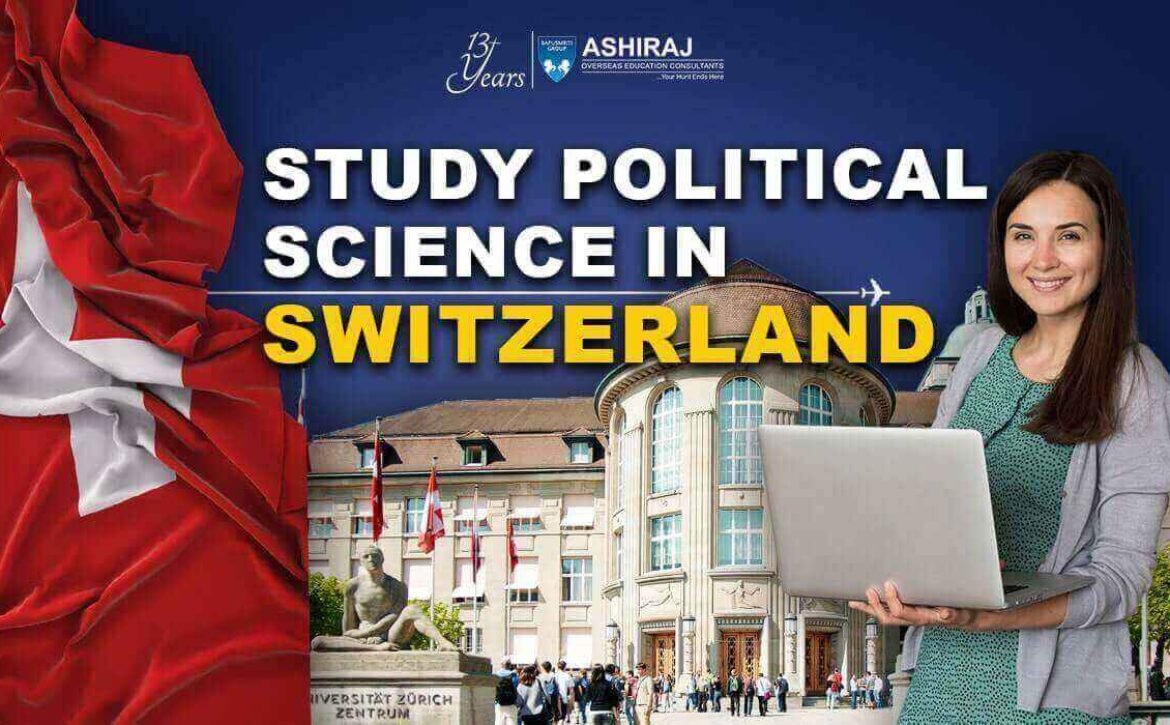
Political Science in Switzerland
Political Science in Switzerland encompasses a rich tapestry of political structures and ideologies unique to the nation’s federalist system. Switzerland’s political landscape is characterized by its direct democracy, where citizens actively participate in decision-making processes through referendums and initiatives. This system fosters a culture of political engagement and decentralization, with power distributed among the federal government, cantons, and municipalities. Furthermore, Switzerland’s neutrality and commitment to international diplomacy contribute to its distinctive position in global politics.
In Political Science, Switzerland serves as a fascinating case study for understanding the dynamics of federalism, direct democracy, and consensus-building in governance. Scholars delve into the intricacies of Swiss political institutions, such as the Federal Assembly, Federal Council, and the unique system of concordance. Moreover, the Swiss model provides valuable insights into managing diversity, as the country comprises multiple linguistic and cultural regions. By examining Switzerland’s political landscape, researchers gain valuable perspectives on the challenges and opportunities inherent in decentralized governance and direct democratic practices.
Why to Study Political Science in Switzerland?
- Unique Political System: Switzerland boasts a distinctive federalist system with direct democracy at its core, offering unparalleled insights into alternative governance structures.
- Active Citizen Participation: With regular referendums and initiatives, Switzerland encourages citizen engagement, providing a firsthand experience of democratic decision-making processes.
- International Neutrality: Switzerland’s neutrality serves as a valuable case study in international relations, offering perspectives on diplomacy, peacekeeping, and global governance.
- Diverse Cultural Landscape: The country’s multilingual and multicultural environment provides a rich context for studying political dynamics, fostering an understanding of managing diversity in governance.
- Innovative Governance Practices: Switzerland’s consensus-based decision-making and concordance system present innovative approaches to political negotiation and policy formation.
- Research Opportunities: The Swiss political landscape offers ample research opportunities for scholars interested in federalism, direct democracy, and comparative politics.
- Practical Experience: By studying in Switzerland, students gain practical exposure to political processes, interacting with policymakers, and observing political institutions firsthand.
- Global Relevance: Switzerland’s role in global governance and its influence in international organizations make studying Political Science here relevant on a global scale.
Top Universities to Study Political Science in Switzerland
University | QS World University Rankings 2023 | Type of University | Average Annual Fees | Programs Offered |
University of Zurich | 45 | Public | $1,000 – $1,500 | Bachelor’s, Master’s, PhD |
ETH Zurich | 54 | Public | $1,000 – $1,500 | Bachelor’s, Master’s, PhD |
University of Geneva | 68 | Public | $1,000 – $1,500 | Bachelor’s, Master’s, PhD |
University of Lausanne | 89 | Public | $1,000 – $1,500 | Bachelor’s, Master’s, PhD |
University of Basel | 102 | Public | $1,000 – $1,500 | Bachelor’s, Master’s, PhD |
Switzerland stands out as a premier destination for studying Political Science, with its top universities consistently ranking high in global assessments. The University of Zurich and ETH Zurich, renowned for their academic excellence, offer a wide range of programs from bachelor’s to doctoral levels, providing comprehensive education in Political Science. The University of Geneva and the University of Lausanne also feature prominently, with robust curricula and research opportunities for aspiring political scientists. Additionally, the University of Basel rounds off the list, providing quality education in Political Science at affordable fees. With such diverse options and academic excellence, Switzerland remains a top choice for students seeking to pursue Political Science.
Course Curriculum for Political Science in Switzerland
- Foundational Studies: Political Science programs in Switzerland typically start with foundational courses covering the basics of political theory, comparative politics, and international relations.
- Swiss Political System: A key focus is on understanding Switzerland’s unique political system, including federalism, direct democracy, and the role of cantons in governance.
- International Relations: Courses delve into Switzerland’s role in global politics, exploring topics such as neutrality, diplomacy, and international organizations.
- Research Methods: Emphasis is placed on research methodologies, equipping students with the tools to conduct empirical research and analysis in political science.
- Electives and Specializations: Students have the opportunity to specialize in areas of interest such as political economy, conflict resolution, or European politics through elective courses.
- Internships and Practicums: Many programs offer internships or practicums where students gain hands-on experience in political institutions, NGOs, or international organizations.
- Capstone Projects or Theses: Culminating the program, students often undertake capstone projects or theses, allowing them to apply their knowledge and research skills to a specific area of political science.
Studying Political Science in Switzerland provides a comprehensive understanding of the country’s political landscape while offering insights into global politics and governance. The curriculum is designed to equip students with theoretical knowledge, practical skills, and analytical tools necessary for careers in academia, government, diplomacy, or international organizations.
Eligibility Criteria & Admission Requirements for MS in Political Science in Switzerland
- Language Proficiency: Applicants must demonstrate proficiency in English or German through standardized tests such as IELTS or TOEFL. Typically, a minimum score of 6.5 in IELTS or 90 in TOEFL is required.
- Standardized Tests: Some universities may require applicants to submit scores from standardized tests like GRE or GMAT. A competitive score, usually above 155 in GRE or 650 in GMAT, is often expected.
- Academic Certificates: Applicants should possess a bachelor’s degree in Political Science or a related field from a recognized institution. Transcripts demonstrating academic achievement are usually required.
- Work Experience: While not always mandatory, relevant work experience in political science, public policy, or related fields may strengthen an applicant’s profile.
- Passport & Student Visa: International applicants must have a valid passport and obtain a student visa to study in Switzerland. This process typically involves providing proof of acceptance from a Swiss university, financial documentation, and completing visa application requirements.
Requirement | Minimum Marks/Scores |
IELTS | 6.5 |
TOEFL | 90 |
GRE | 155 |
GMAT | 650 |
Meeting these eligibility criteria ensures that candidates are prepared to excel in Political Science programs in Switzerland, contributing to the vibrant academic community and gaining valuable insights into the country’s unique political landscape.
Documents Required for Studying Political Science in Switzerland
- Passport: A valid passport is essential for international students applying to study Political Science in Switzerland, serving as proof of identity and nationality.
- Letters of Recommendation (LOR): Typically, two LORs are required from academic or professional referees who can attest to the applicant’s qualifications, character, and suitability for the program.
- Statement of Purpose (SOP): An SOP outlines the applicant’s academic background, career goals, and reasons for choosing Political Science in Switzerland, providing insights into their motivation and aspirations.
- Curriculum Vitae (CV): A comprehensive CV highlights the applicant’s academic achievements, work experience, extracurricular activities, and any relevant skills or accomplishments.
- Official Transcripts: Official high school transcripts and educational certificates are necessary to demonstrate academic qualifications and fulfill admission requirements for Political Science programs.
- Work Experience Certificate: If applicable, a work experience certificate verifying relevant professional experience may be required, showcasing the applicant’s practical skills and contributions.
- Proof of Financial Resources: To obtain a student visa, applicants must provide evidence of sufficient financial resources to cover tuition fees, living expenses, and other costs associated with studying in Switzerland.
Ensuring the timely submission of these documents is crucial for a smooth application process and admission to Political Science programs in Switzerland. Each document plays a vital role in assessing the applicant’s qualifications, readiness, and suitability for the academic endeavor ahead.
Admission Process for Political Science in Switzerland
- Research: Begin by researching universities offering Political Science programs in Switzerland. Consider factors like academic reputation, faculty expertise, and program curriculum.
- Check Eligibility: Review the eligibility criteria for each university, including academic requirements, language proficiency exams (such as IELTS or TOEFL), and standardized test scores (like GRE or GMAT).
- Prepare Documents: Gather required documents, including transcripts, certificates, passport, letters of recommendation, statement of purpose, curriculum vitae, and proof of financial resources.
- Submit Application: Complete the university’s online application form and upload the necessary documents before the deadline. Pay attention to specific instructions and requirements for each institution.
- Wait for Response: After submitting your application, wait for the university to review your materials. This process may take several weeks to months, depending on the institution and program.
- Interview (if required): Some universities may conduct interviews as part of the admissions process. Prepare for these interviews by researching the program and articulating your academic and career goals.
- Receive Admission Decision: Once the university has reviewed your application, you will receive an admission decision. This may be communicated via email or through an online portal.
- Accept Offer and Apply for Visa: If accepted, follow the instructions to accept the offer of admission. Then, apply for a student visa to study Political Science in Switzerland, ensuring compliance with visa requirements and deadlines.
Following these steps diligently will increase your chances of securing admission to Political Science programs in Switzerland, paving the way for a rewarding academic journey.
“Education is the most powerful weapon which you can use to change the world.”
Nelson Mandela
Cost of Political Science Course in Switzerland
- Tuition Fees: While tuition fees in Switzerland are generally lower compared to other European countries, they still vary between universities and programs. On average, international students can expect to pay between $1,000 to $1,500 per year for Political Science programs.
- Living Expenses: Switzerland is known for its high standard of living, which also means higher living costs. Rent, food, transportation, and other daily expenses can add up. On average, students should budget around $1,500 to $2,000 per month for living expenses.
- Health Insurance: Health insurance is mandatory for all students in Switzerland. The cost of health insurance varies depending on the coverage and provider but typically ranges from $80 to $200 per month.
- Books and Supplies: Students should budget for textbooks, course materials, and other academic supplies, which can amount to a few hundred dollars per semester.
- Additional Costs: Additional expenses may include visa fees, travel costs, extracurricular activities, and personal expenses. It’s essential to budget for these miscellaneous costs to ensure financial stability throughout your studies.
Considering these factors, studying Political Science in Switzerland requires careful financial planning to manage expenses effectively and ensure a fulfilling academic experience.
Scholarships for Political Science Courses in Switzerland
Scholarship Name | Amount | Application Deadline | Eligibility Criteria |
Swiss Government Excellence Scholarships | Full tuition fees, monthly stipend, insurance, etc. | Varies (typically September to December) | International students pursuing master’s or PhD degrees in Political Science at Swiss universities. |
ETH Zurich Excellence Scholarship & Opportunity Programme | CHF 12,000 to CHF 42,000 per year | 15 December | Master’s students with outstanding academic performance in Political Science or related fields at ETH Zurich. |
University of Geneva Excellence Masters Fellowships | CHF 10,000 to CHF 15,000 per year | 15 March | Outstanding international students applying for master’s programs in Political Science at the University of Geneva. |
University of Zurich Graduate School of Economic Globalization (GSEFG) Scholarships | CHF 30,000 per year | 31 January | PhD students conducting research on economic globalization, including political aspects, at the University of Zurich. |
Swiss-European Mobility Programme (SEMP) Scholarships | Varies | Varies (check individual universities) | Available for students enrolled in Political Science programs participating in the SEMP exchange program between Swiss and European universities. |
Securing a scholarship can significantly alleviate the financial burden of studying Political Science in Switzerland. Applicants should carefully review the eligibility criteria and application deadlines for each scholarship opportunity to maximize their chances of success. Additionally, it’s advisable to explore other funding options, such as grants, fellowships, and assistantships, to supplement educational expenses.
Career Opportunities After Political Science in Switzerland
Job Profile | Average Salary (CHF) |
Political Analyst | 80,000 – 120,000 |
Policy Advisor | 90,000 – 130,000 |
Diplomat | 100,000 – 150,000 |
Government Relations Specialist | 85,000 – 120,000 |
International Development Consultant | 90,000 – 130,000 |
Political Science graduates in Switzerland have diverse career opportunities across government, academia, international organizations, and the private sector. Political analysts analyze political trends, conduct research, and provide insights to policymakers, earning an average salary of CHF 80,000 to CHF 120,000. Policy advisors offer strategic advice on policy matters to governments and organizations, earning between CHF 90,000 to CHF 130,000 annually. Diplomats represent Switzerland’s interests abroad, negotiating agreements and fostering international relations, with salaries ranging from CHF 100,000 to CHF 150,000. Government relations specialists work to build relationships between organizations and government entities, earning an average salary of CHF 85,000 to CHF 120,000. International development consultants focus on global development projects, earning between CHF 90,000 to CHF 130,000. With a strong academic background in Political Science in Switzerland, graduates can pursue rewarding careers with competitive salaries in various fields.
Frequently Asked Questions About Political Science in Switzerland
Some of the top universities in Switzerland offering Political Science programs include the University of Zurich, ETH Zurich, University of Geneva, University of Lausanne, and University of Basel.
Tuition fees for Political Science programs in Switzerland vary between $1,000 to $1,500 per year for international students.
Yes, there are various scholarships available for Political Science students in Switzerland, including the Swiss Government Excellence Scholarships and university-specific scholarships.
Political Science programs in Switzerland are typically taught in English, although some may offer courses in German or French.
Graduates of Political Science in Switzerland can pursue careers as political analysts, policy advisors, diplomats, government relations specialists, and international development consultants.
While work experience is not always mandatory, relevant experience in political science or related fields may strengthen an applicant’s profile.
The duration of Political Science programs in Switzerland varies, with bachelor’s programs typically lasting three years and master’s programs lasting one to two years.
Yes, many universities in Switzerland offer opportunities for research projects and internships, allowing students to gain practical experience and apply theoretical knowledge.
Admission requirements typically include academic transcripts, language proficiency test scores (such as IELTS or TOEFL), letters of recommendation, statement of purpose, and proof of financial resources.
International students can apply for a student visa to study Political Science in Switzerland by submitting required documents, including proof of acceptance from a Swiss university, financial documentation, and completing visa application requirements at the Swiss embassy or consulate in their home country.




